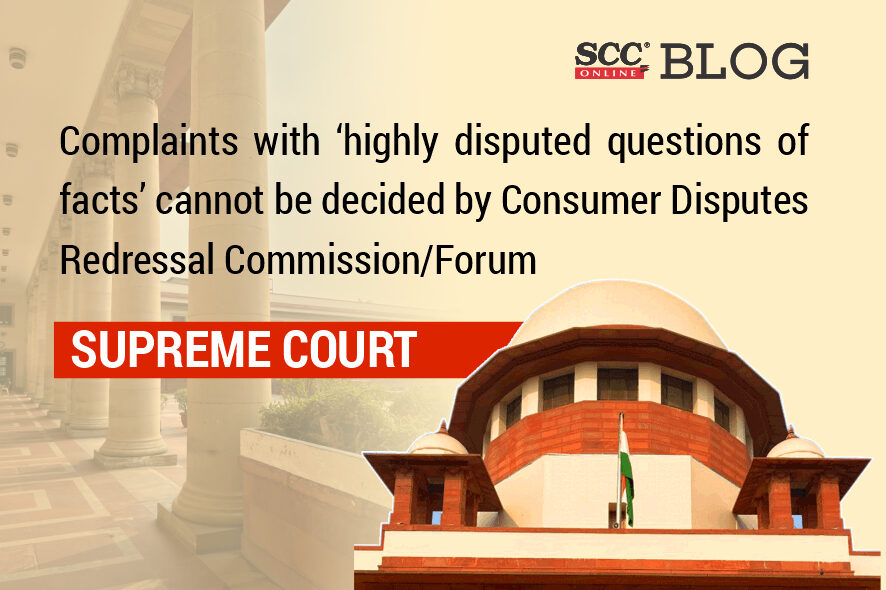Supreme Court: In an appeal challenging the National Consumer Disputes Redressal Commission (‘NCDRC’) dismissing the appeal against Tamil Nadu State Consumer Disputes Redressal Commission (‘SCDRC’) holding the bank liable for deficiency in service under Section 2(1)(g) of Consumer Protection Act, 1986, the Division Bench of Ajay Rastogi and Bela M. Trivedi, JJ. held that complaints involving highly disputed questions of facts could not be decided by NCDRC or SCDRC respecting the summary nature of proceedings under the 1986 Act.
The original complainant (‘respondent’ in the present matter) filed a complaint against the appellant bank before the Tamil Nadu State Consumer Disputes Redressal Commission (SCDRC) seeking directions against the bank to re-credit Rs 8 lakhs covering two demand drafts (‘DDs’) of RS 5 lakhs and 3 lakhs in his Current Account. The respondent alleged that he was the Managing Director of ‘D-Cube Constructions (P) Ltd.’, and there were Directors of the said company. A Current Account was opened in the name of respondent’s company with the bank on 13-4-1995 and only respondent could operate the same. There was a misunderstanding between the respondent and one of the Directors after which he wrote a letter on 8-1-1997 to the bank restricting any withdrawal from the company’s account.
The respondent claimed that an NRI had informed him of sending two DDs of Rs 5 lakhs and Rs 3 lakhs, total amount being Rs 8 lakhs which were not credited in the company’s account. Later, it was found that another account in the name of ‘D-Cube Construction’ was opened, and the two DDS were credited in that account. The respondent approached SCDRC alleging collusion and negligence on part of the bank regarding the two DDs.
SCDRC allowed the respondent’s complaint with cost and directed the bank to pay the sum of Rs 8 lakhs with compensation of Rs 1 lakh. Appeal before NCDRC was dismissed which has been challenged in the instant appeal.
The Court pointed towards the summary nature of proceedings and considered the question of whether Consumer Disputes Redressal Commission/Forum could entertain the complaint involving highly disputed questions of facts or allegations of tortious acts?
The Court noted the facts that the two DDs were issued in the name of ‘D-Cube Construction’ and not ‘D-Cube Constructions (P) Ltd.’, the second account in the name of company was opened by one of the Directors, the bank received a letter on 15-2-1997 from ‘D-Cube Constructions (P) Ltd.’ giving no-objection to opening another current account in the name of ‘D-Cube Construction’, and that there were ongoing disputes between the Directors of that company.
Looking at the circumstances of the instant matter, the Court observed that “it could not be said that there was any willful default or imperfection or short coming so as to term it as the deficiency in service on part of the bank within the meaning of Section 2(1)(g) of Consumer Protection Act, 1986”. The Court supported the bank’s reliance upon Ravneet Singh Bagga v. KLM Royal Dutch Airlines, (2000) 1 SCC 66 elaborating deficiency in service. The Court also relied on Oriental Insurance Co. Ltd. v. Munimahesh Patel, (2006) 7 SCC 655 wherein the Court elucidated the proceedings before the Commission essentially being summary in nature restricting adjudication of issues involving disputed factual questions.
The Court observed that based on facts of the matter, “there was no willful fault, imperfection, shortcoming or inadequacy in the discharge of duty on part of employees of bank to be termed as ‘deficiency in service’ under Section 2(1)(g) of 1986 Act.” The Court held that complaints involving highly disputed questions of facts, or cases involving tortious acts or criminality like fraud or cheating could not be decided by SCDRC or NCDRC respecting the summary nature of proceedings. The Court further clarified that the burden of proving deficiency in service under Section 2(1)(g) of 1986 Act would always be upon the person alleging it.
The Court said that the respondent miserably failed to discharge his burden to prove deficiency in service on part of the bank employees. The Court, therefore, dismissed the original complaint, quashed and set aside the orders passed by the State and National Consumer Disputes Commission.
[City Union Bank Ltd. V.R. Chandramohan, 2023 SCC OnLine SC 341, judgment dated 27-3-2023]
Judgment by: Justice Bela M. Trivedi






